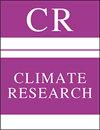通过适应行为提高气候变化下的要素效率:转基因抗虫棉分析
IF 1.6
4区 地球科学
Q4 ENVIRONMENTAL SCIENCES
引用次数: 0
摘要
摘要:转基因抗虫棉已被视为适应气候变化的一种潜在技术手段,但它如何影响要素效率仍有许多未知数。本研究利用中国 1993 年至 2020 年的面板数据,探讨了转基因抗虫棉对气候变化下棉花生产要素效率的影响。我们发现,转基因抗虫棉的采用显著提高了农药的产出弹性,同时降低了化肥的产出弹性,但对劳动力没有影响。这主要是因为转基因抗虫棉减少了农药的投入,而气候变化导致的虫害爆发预计会增加农药的投入。相反,它增加了化肥的投入,从而降低了化肥的产出弹性。此外,对农药和化肥弹性的影响在长江流域和中国西北地区较弱,但在黄河流域较强。这些发现有助于更好地理解气候变化下农业生产要素效率如何对采取适应性行为做出反应。这些研究结果还可作为参考,帮助农民评估适应行为的有效性,优化适应气候变化的资源配置。本文章由计算机程序翻译,如有差异,请以英文原文为准。
Improving factor efficiency under climate change through adaptive behavior: analysis of genetically modified insect-resistant cotton
ABSTRACT: Genetically modified insect-resistant cotton has been recognized as a potential technological means of adapting to climate change, but much remains unknown about how it affects factor efficiency. Using panel data for China from 1993 to 2020, this study explored the impact of genetically modified insect-resistant cotton on the factor efficiency of cotton production under climate change. We found that the adoption of genetically modified insect-resistant cotton significantly increases the output elasticity of pesticides while diminishing that of fertilizer, but has no effect on labor. This is mainly because it reduces the input of pesticides, which is otherwise expected to increase as a result of pest outbreaks caused by climate change. In contrast, it increases fertilizer input and thus reduces the output elasticity of fertilizer. Additionally, the effects on pesticide and fertilizer elasticity were weaker in the Yangtze River basin and northwest China, but stronger in the Yellow River basin. These findings provide a better understanding of how agricultural production factor efficiency responds to the adoption of adaptive behaviors under climate change. They can also serve as a reference to assist farmers in evaluating the effectiveness of adaptive behaviors and optimizing resource allocation for climate change adaptation.
求助全文
通过发布文献求助,成功后即可免费获取论文全文。
去求助
来源期刊

Climate Research
地学-环境科学
CiteScore
2.90
自引率
9.10%
发文量
25
审稿时长
3 months
期刊介绍:
Basic and applied research devoted to all aspects of climate – past, present and future. Investigation of the reciprocal influences between climate and organisms (including climate effects on individuals, populations, ecological communities and entire ecosystems), as well as between climate and human societies. CR invites high-quality Research Articles, Reviews, Notes and Comments/Reply Comments (see Clim Res 20:187), CR SPECIALS and Opinion Pieces. For details see the Guidelines for Authors. Papers may be concerned with:
-Interactions of climate with organisms, populations, ecosystems, and human societies
-Short- and long-term changes in climatic elements, such as humidity and precipitation, temperature, wind velocity and storms, radiation, carbon dioxide, trace gases, ozone, UV radiation
-Human reactions to climate change; health, morbidity and mortality; clothing and climate; indoor climate management
-Climate effects on biotic diversity. Paleoecology, species abundance and extinction, natural resources and water levels
-Historical case studies, including paleoecology and paleoclimatology
-Analysis of extreme climatic events, their physicochemical properties and their time–space dynamics. Climatic hazards
-Land-surface climatology. Soil degradation, deforestation, desertification
-Assessment and implementation of adaptations and response options
-Applications of climate models and modelled future climate scenarios. Methodology in model development and application
 求助内容:
求助内容: 应助结果提醒方式:
应助结果提醒方式:


